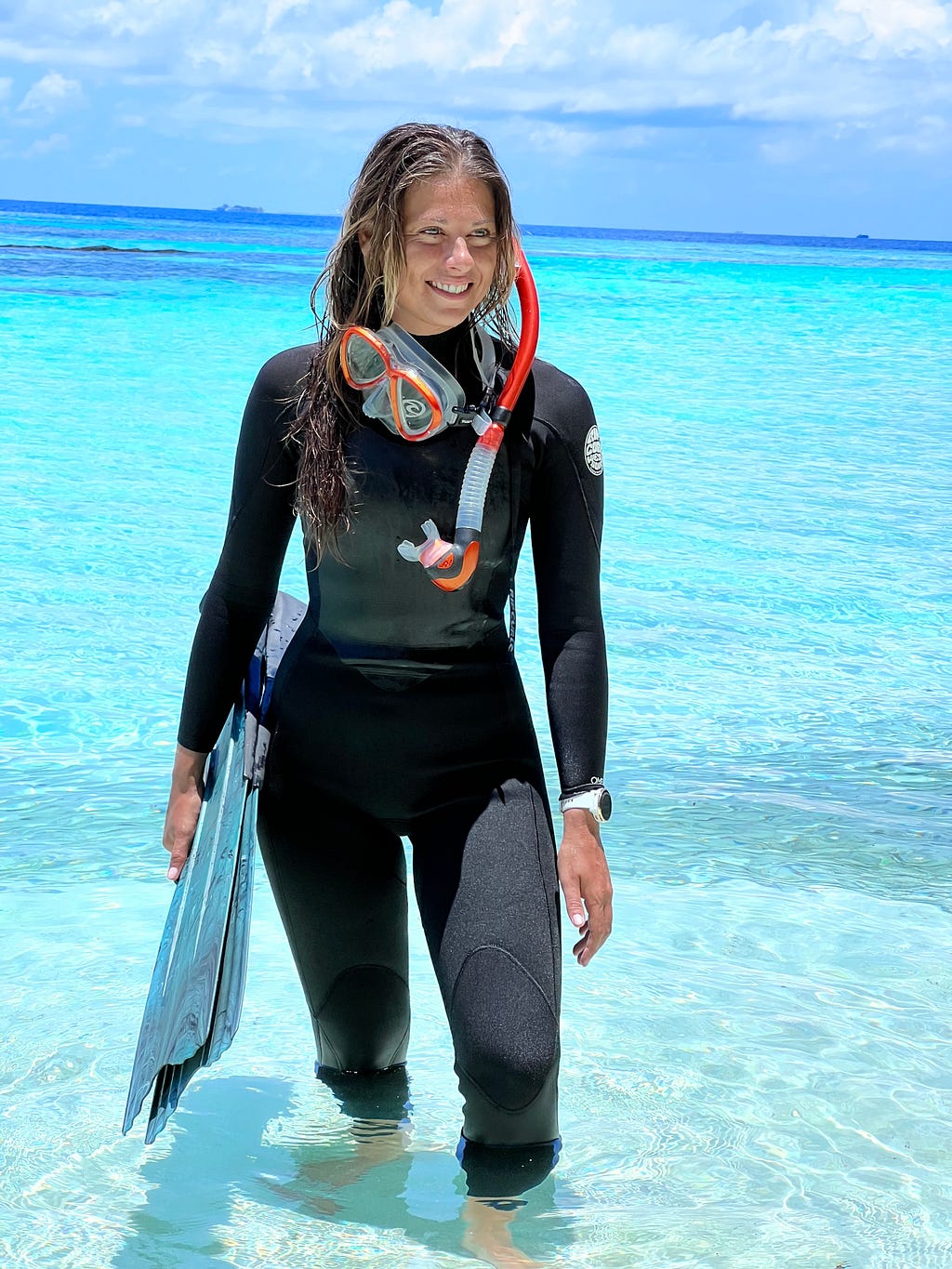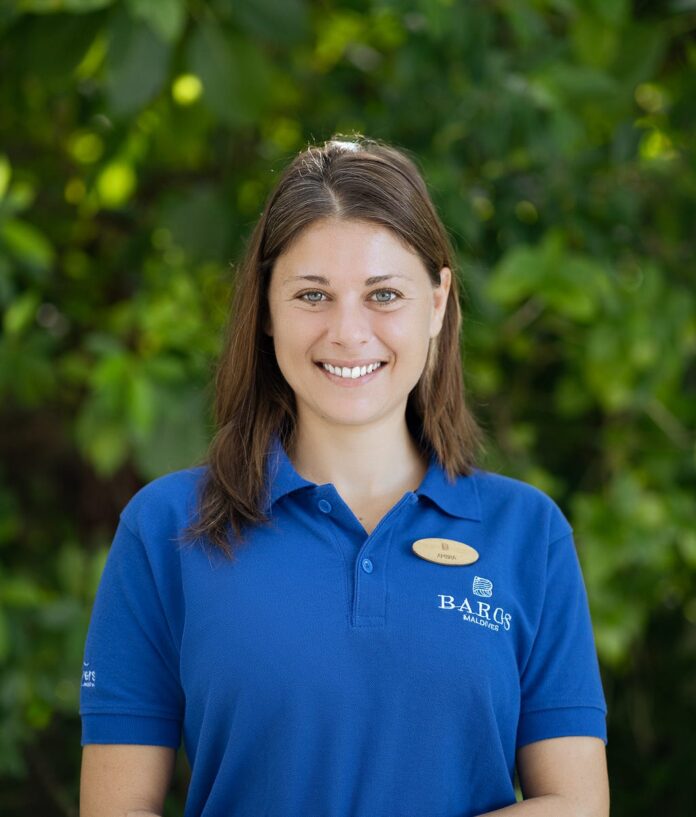Ambra Federica Dugaria Of Baros Maldives: 5 Things We Must Do To Inspire The Next Generation About Sustainability And The Environment
An Interview With Martita Mestey
I adopt a rather candid stance on the subject, recognizing that significant harm to the environment has already been inflicted. Historically, our insatiable energy consumption and deforestation have profoundly impacted the earth. For generations, we erroneously perceived humans as central figures in the grand scheme of things.
As a part of my series about what we must do to inspire the next generation about sustainability and the environment, I had the pleasure of interviewing Ambra Federica Dugaria.
Ambra, an Italian with a distinctive Spanish background, embarked on her Maldives journey in 2014 as a diving instructor, eventually becoming the Base Leader at Baros Maldives in 2020. With a degree in Oceanography and Marine Science, she has over 5,500 dives and specializes in underwater currents, water movements and plankton. Ambra’s passion lies in integrating marine sciences with tourism, educating individuals on environmental awareness and adopting a respectful approach to the environment, emphasizing that everyone is impacted by environmental actions and consequences.
Thank you so much for doing this with us! Our readers would love to “get to know you” a bit more. Can you tell us a bit about how you grew up?
I am from Italy originally, but during my formative years, my family relocated to Spain. My upbringing occurred on an island, and upon completing my university education, I decided to leave Spain. Perhaps my affinity for the waters can be attributed to my island upbringing. Regardless, a profound curiosity for the aquatic realm has been an enduring aspect of my life.
Was there an “aha moment” or a specific trigger that made you decide you wanted to become a scientist or environmental leader? Can you share that story with us?
As I mentioned, I have held a profound fascination with the ocean and marine life from a young age. My interest in diving began to actively take shape at the age of 16, but I vividly recall urging my parents to let me dive since I was merely 10 years old. Early on, I delved into teaching diving while balancing my academic commitments and leisurely diving center activities. By the time I started at Marine Science University in Spain, I was already a licensed and active dive instructor.
As I reflect on my journey, I cannot pinpoint a specific moment when I realized this was the path I should pursue; rather, it feels as though destiny had guided me towards it all along.
Is there a lesson you can take out of your own story that can exemplify what can inspire a young person to become an environmental leader?
I think when one’s curiosity extends beyond the commonplace, it must be nurtured to cultivate a passion that brings both personal satisfaction and expertise. I firmly hold the belief that our abilities to excel in a particular field stem from the deep interest we invest in it, making the required efforts feel more effortless due to our genuine enthusiasm. Throughout my career, I have noticed that environmental matters often take a backseat in our lives, when, in reality, environmental education should be instilled from a young age.
Can you tell our readers about the initiatives that you or your company are taking to address climate change or sustainability? Can you give an example for each?
In my opinion, sustainability is often perceived as a significant commitment, but in truth, the value of “everyday” small actions surpasses grand gestures. By beginning to educate people from the ground up, like teaching them how to plant corals, we can kindle a deeper sensitivity within the audience. The act of explaining the beauty, complexity and significance of creatures like corals, turtles and sharks can evoke a profound appreciation for marine life.
At Baros Maldives, we work with the resources at hand and focus on what we encounter daily. We’ve implemented eco-friendly practices to reduce its environmental impact, such as replacing plastic straws with paper straws, banning plastic bags and using glass water and refreshment bottles that are reused for multiple fillings. Baros remains committed to continued progress in terms of sustainability, improving its services one step at a time. Our coral restoration initiatives play a substantial role in educating our guests, enabling them to grasp the intricate functioning of coral reefs, which, in turn, broadens their understanding and perception of the oceans.
Can you share 3 lifestyle tweaks that the general public can do to be more sustainable or help address the climate change challenge?
I view sustainable practices not merely as a means to combat climate change but rather as an invitation to treat our resources with daily reverence. Embracing the ethos of using resources mindfully, saving them whenever possible and prioritizing renewable energies can collectively make a substantial impact.
By shunning complacency, we can lead more active lives, fostering a proactive approach towards sustainability. It is in the small, routine actions that true change resides — opting for reusable bags while shopping, choosing bicycles or public transportation over cars and embracing a simpler, more essential way of living. These seemingly insignificant habits, when practiced consistently, create the difference we seek to achieve a sustainable future.

Ok, thank you for all that. Here is the main question of our interview: The youth-led climate strikes of September 2019 showed an impressive degree of activism and initiative by young people on behalf of climate change. This was great, and there is still plenty that needs to be done. In your opinion, what are 5 things parents should do to inspire the next generation to become engaged in sustainability and the environmental movement?
I adopt a rather candid stance on the subject, recognizing that significant harm to the environment has already been inflicted. Historically, our insatiable energy consumption and deforestation have profoundly impacted the earth. For generations, we erroneously perceived humans as central figures in the grand scheme of things.
Now, I believe the foremost priority should lie in educating our children about the equitable importance of all living beings on this planet. It is imperative to instill the notion that humans hold no higher significance than any other creature.
Furthermore, fostering a harmonious coexistence with nature can nurture a kinder and more respectful attitude towards the environment and fellow human beings alike. Encouraging our children to step out of their comfort zones is crucial, particularly in this age of artificial intelligence where ease of access prevails. Learning to embrace a simpler, more balanced lifestyle is essential for progress.
Regrettably, our current patterns of excessive spending, consumption and overindulgence also bear consequences that we cannot and should not ignore.
How would you articulate how a business can become more profitable by being more sustainable and more environmentally conscious? Can you share a story or example?
In recent years, the tourism industry has undergone rapid transformations, with modern travelers meticulously examining online reviews and other individuals’ experiences before finalizing their hotel bookings. Among the most scrutinized aspects are the eco-friendly and sustainable practices offered by the properties. These practices are highly contingent on the hotel’s surroundings, location and the purpose of the guests’ trips. For instance, hotels that emphasize diving and snorkeling as the main activities must prioritize conservation, education and fostering awareness to protect and preserve coral reefs.
Thankfully, a positive trend has emerged in the Maldives, where the majority of hotels have taken commendable steps to eliminate single-use plastics from their services. Consequently, guests now expect this practice to be the minimum standard during their stay, and any deviation from this eco-conscious approach is likely to be remarked upon and highlighted by discerning travelers.
None of us are able to achieve success without some help along the way. Is there a particular person who you are grateful towards who helped get you to where you are? Can you share a story about that?
I am immensely grateful to my mother, as she has been the unwavering pillar of support throughout my journey — through important decisions and life’s challenges. Her presence and encouragement have played a crucial role in shaping who I am today.
You are a person of great influence and doing some great things for the world! If you could inspire a movement that would bring the greatest amount of good to the greatest amount of people, what would that be? You never know what your idea can trigger. 🙂
I would advocate for embracing the power of small, meaningful actions. Instead of pursuing grand gestures or dramatic schemes, I believe it’s the cumulative impact of these little changes that can truly make a difference. Encouraging individuals to adopt these small changes would create a chain reaction, where the collective effect becomes significant. The beauty of these incremental adjustments lies in their ease of implementation and long-term sustainability, unlike a single drastic change that might be harder to maintain over time.
Do you have a favorite life lesson quote? Can you tell us how that was relevant to you in your own life?
I firmly value the essence of teamwork, yet I equally hold a deep appreciation for the potential of individual efforts. Although I may not have a specific quote to sum up my beliefs, I have embraced a valuable lesson: personal pursuits should never harm the environment or others, as selfishness is undesirable. Although human nature can lean towards selfishness, work that emanates from the heart carries a natural sense of responsibility to avoid causing harm.
A mantra I frequently stress to my team and myself is to “accept the consequences” of our choices. This fosters a culture of accountability and mindfulness, encouraging us to take ownership of the outcomes of our actions and decisions.
As I mentioned earlier, I believe that small actions collectively make a significant impact. Leading by example is crucial in inspiring and influencing others to adopt positive measures. It’s essential to practice what we preach; one cannot expect others to embrace certain principles if we ourselves fail to follow them diligently.
What is the best way for people to follow you on social media?
I am sorry but, in my personal capacity, I prefer not to amass followers. For those keen on staying updated on the latest initiatives and new activities at Baros, I recommend following Baros’s social media channels. There, you’ll find all the exciting updates and happenings on our blissful island.
Facebook: https://www.facebook.com/barosresort
Instagram: https://www.instagram.com/barosmaldives/
Twitter: https://twitter.com/BarosMaldive
This was so inspiring. Thank you so much for joining us!
Ambra Federica Dugaria Of Baros Maldives: 5 Things We Must Do To Inspire The Next Generation About… was originally published in Authority Magazine on Medium, where people are continuing the conversation by highlighting and responding to this story.


